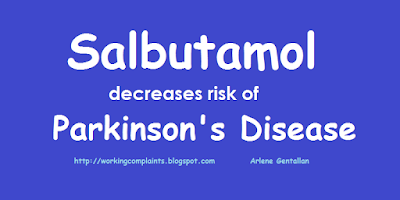Salbutamol decreases risk of Parkinson's Disease
Salbutamol decreases risk of Parkinson's Disease
By: Arlene Gentallan
Beta-2 adrenergic agonist like the asthma medication salbutamol and clenbuterol decreases a person risk of developing parkinson's disease.
Salbutamol is an asthma medication. It works in decreasing risk of parkinson's disease by suppressing the expression of SNCA gene.
Parkinson's disease is a movement disorder that affect people at all walk of life. It's symptoms starts as mild but progressively worsens over time: tremors, difficulty talking, muscle stiffness, slow movement, loss of balance and coordination. Although there are treatments to help manage symptoms, currently, parkinson's disease has no cure.
In parkinson's disease, neurons that produce the neurotransmitter dopamine are destroyed. Dopamine is essential for both voluntary and involuntary body movement.
Researchers used an 11 year prescription data involving 4 million Norwegian to find association among medications and parkinson's disease.
They found out that people who received beta-2 adrenergic agonist medication like salbutamol cut their risk of developing parkinson's disease by about half.
Whereas, people who received beta blockers like propanolol were twice as likely to develop parkinson's disease.
Note: Although this research provides promising potential, additional research is still needed. Salbutamol is not an approved medication for parkinson's disease.
Resources:
Mittal, S., Bjørnevik, K., et al. (2017). ß2-Adrenoreceptor is a regulator of the a-synuclein gene driving risk of Parkinson’s disease. Science. Vol. 357, Issue 6354, pp. 891-898. DOI: 10.1126/science.aaf3934
By: Arlene Gentallan
 |
| Salbutamol decreases risk of Parkinson's Disease |
Beta-2 adrenergic agonist like the asthma medication salbutamol and clenbuterol decreases a person risk of developing parkinson's disease.
Salbutamol is an asthma medication. It works in decreasing risk of parkinson's disease by suppressing the expression of SNCA gene.
Parkinson's disease is a movement disorder that affect people at all walk of life. It's symptoms starts as mild but progressively worsens over time: tremors, difficulty talking, muscle stiffness, slow movement, loss of balance and coordination. Although there are treatments to help manage symptoms, currently, parkinson's disease has no cure.
In parkinson's disease, neurons that produce the neurotransmitter dopamine are destroyed. Dopamine is essential for both voluntary and involuntary body movement.
Researchers used an 11 year prescription data involving 4 million Norwegian to find association among medications and parkinson's disease.
They found out that people who received beta-2 adrenergic agonist medication like salbutamol cut their risk of developing parkinson's disease by about half.
Whereas, people who received beta blockers like propanolol were twice as likely to develop parkinson's disease.
Note: Although this research provides promising potential, additional research is still needed. Salbutamol is not an approved medication for parkinson's disease.
Resources:
Mittal, S., Bjørnevik, K., et al. (2017). ß2-Adrenoreceptor is a regulator of the a-synuclein gene driving risk of Parkinson’s disease. Science. Vol. 357, Issue 6354, pp. 891-898. DOI: 10.1126/science.aaf3934







